Inside the election where everyone has 38 votes
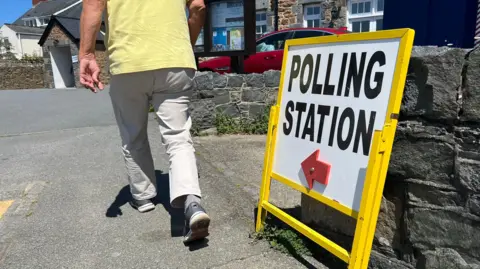 BBC
BBCHeading to the polls voters often have in mind who or which party they plan to vote for - but what if there are 82 candidates and you have up to 38 votes? This was the issue for Guernsey voters last week as they decided who would run their government - the States of Guernsey - for the next four years.
First-time voter Harry Snell, 19, said he chose to use all 38 of his votes as it was important to vote for the selection of candidates "that you want".
While voting itself took "five minutes", Mr Snell, who is home from studying theatre at university, spent three nights deciding who to vote for.
Two of those nights were spent reading the 276-page manifesto booklet, a process he described as a "real drag".
He also listened to interviews and podcasts with candidates as well as researching issues he cared about.
Mr Snell brought a handwritten list into the polling booth of the candidates he planned to vote for, but felt having so many on the ballot was "just ridiculous".
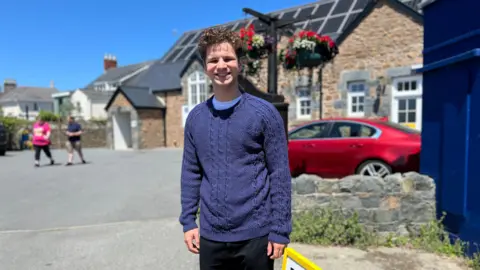
While some chose to use all 38 of their votes like Mr Snell, the average number cast was 22 - down from 26 at the last election.
Businessman Doug Perkins, 82, said he used 23 of his votes.
Mr Perkins co-founded opticians Specsavers in the island in 1984 with his wife, Dame Mary Perkins.
He felt the process was "clear" and "efficient" but he had to do "a lot of reading" to inform his choices.
"I was wondering how well the election would be delivered, but I don't think it could be delivered better than it has been," said Mr Perkins.
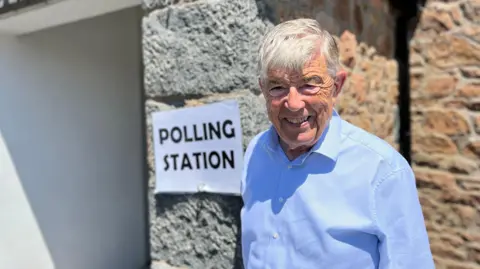
International observers backed up Mr Perkins' assessment of the election process, describing it as "smooth, efficient and calm".
Until 2020, Guernsey elected its deputies to represent seven districts - with each voter getting six or seven votes for the candidates that chose to stand in their distrcit.
Counting the votes under island-wide voting takes "an army of people", according to Keith Bell, Guernsey's returning officer.
He said the votes were counted by four automated scanning machines - each counted batches of 100 votes in just a over minute.
Observer Alvina Reynolds, from St Lucia, said: "While no election is perfect, this one had no major faults – remarkable for a state that has only recently undergone a major change in the way it votes."
However, observers drew attention to declining voter registration, with 52% of eligible voters registered before the election, the lowest since 2020.
The rising cost of living, an acute housing shortage and the long-running debate about whether to introduce tax reforms based on a goods and services tax (GST) were among key issues for voters.
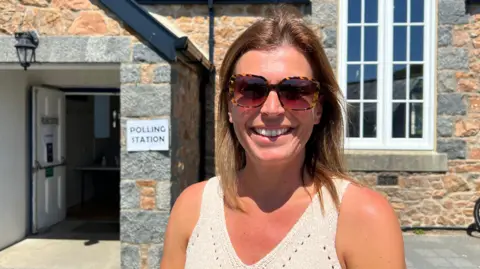
Without traditional political parties facing off - only six candidates stood under the banner of new party Forward Guernsey - some voters found it hard to work out what candidates stood for.
French-born wine expert Aurelia, 42, said while it was her first time voting in Guernsey she would like to see a party system established to improve representation.
She said: "It would be easier if people could choose what sort of decisions they want to make and what the focus of each party is.
"I worry [politicians] lose focus and there's a lot of people arguing over decisions and it slows down the decision-making process."
At 38 choices per person, voters in Guernsey may have the most votes per ballot of any nationwide general election, according to political marketing expert Dr Christopher Pich.
Dr Pich, from the University of Nottingham, has studied Guernsey's political system since 2017 and said island-wide voting had changed the public's relationship with politicians as there was less "direct contact".
He said an "interesting new feature" of this election was the "number of creative ways candidates tried to stand out from the crowd".
"But this time there were battle bikes, speed dating, a stand up comedy night, even a 'Plunge and Politics' event where people could swim with candidates and ask them questions," he said.
Dr Pich said podcasts had also become "important" this election.
"Politicians in the UK are always looking for ways to increase engagement with politics - I think they could learn a lot from Guernsey."
Overwhelming
Political scientist Prof Thomas J Scotto, from the University of Strathclyde, said nation-wide constituencies like Guernsey's were "rare".
Other countries - such as Israel and the Netherlands - also have nation-wide votes, but Guernsey stood out because voters can select so many individual candidates, he said.
Prof Scotto said voting was a "demanding task" with so many choices.
"Without those labels, voters must work hard to understand where candidates stand on key issues," he said.
"With so many names, it can be overwhelming."
Prof Scotto said voters often expressed "distrust" in political parties, but "from a political science perspective parties play a crucial role".
"They help simplify complex choices and allow voters to hold elected officials accountable as part of a shared programme."
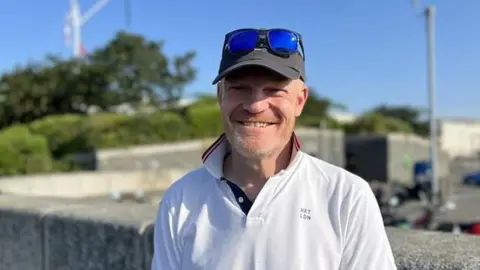
For Prof Scotto, Guernsey's system means "success may rely more on personal ties than policy positions", compared to other countries.
It is something Forward Guernsey leader Gavin St Pier said he wanted to see change.
Candidates for the party agreed to share positions on six key policies, like housing and GST, but are free to vote how they choose on other issues.
Three of its six candidates were elected.
St Pier said: "The electoral system is a reflection of our history and experience, but the reality is we have produced something that is extraordinarily difficult to navigate. It requires real tenacity from the electorate.
"How do we get more people involved in the democratic process? We think offering a policy choice is one way to address that issue."
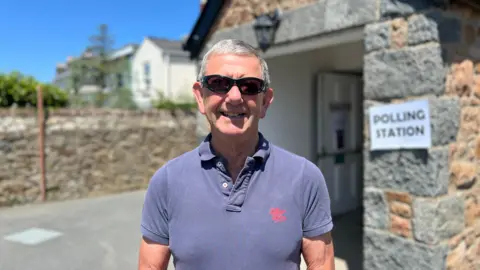
Despite some people's frustrations with the voting system, turnout was high.
Of nearly 20,000 registered voters, 72% voted.
This is down on 2020's record-breaking election, the first under island-wide voting - with more than 30,000 registered voters and an 80% turnout.
However, it is significantly higher than typical UK elections - the 2024 general election had a 59.7% turnout according government figures.
Although voter registration overall was down, with 52% of eligible voters registered before the election - about 3,000 fewer on the roll than in 2020.
Peter Fisher, 73, was among those who thought the system should be simplified.
Mr Fisher said the process was "a lot harder and more time consuming" than voting in the UK, where the main candidates stand for parties in a first-past-the-post voting system.
"If you only vote for one [candidate in Guernsey] you only get one vote. I don't like it at all and I don't think it's as democratic," Mr Fisher said.
"There's too much to read."
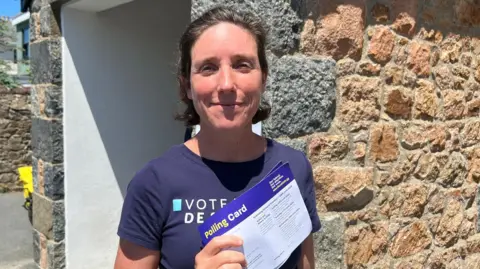
Deputy Lindsay De Sausmarez has been a States member since 2016 and topped this year's poll with more than 10,000 votes - the only candidate picked by more than half of voters.
She said Guernsey's politics could work better "under a party system", but the "transition to it" would be challenging.
De Sausmarez said: "On the plus side it gives everyone who is on the electoral role the opportunity to vote, or not, for every single candidate.
"But on another when it comes to the quality of information to inform your decision it is a little bit disenfranchising."
Deputy Yvonne Burford was also re-elected after she came second the polls.
She said island-wide voting made traditional canvassing, such as door knocking, difficult.
Burford said she it would have taken more than six months to visit all 17,000 households on the electoral register if she spent "seven days a week" on it.
However, she said she had visited "a cross section" of voters to understand the issues that mattered to them.
Regardless of how many votes they got, Guernsey's 38 deputies - joined by two Alderney representatives in making up the States of Guernsey - have some big decisions ahead this term.
Could another change to Guernsey's electoral system be one of them? Only time will tell.
Follow BBC Guernsey on X and Facebook and Instagram. Send your story ideas to [email protected].
